外研版英语必修一Module 6 The Internet and Telecommunications知识点课件(31张ppt)
文档属性
| 名称 | 外研版英语必修一Module 6 The Internet and Telecommunications知识点课件(31张ppt) |
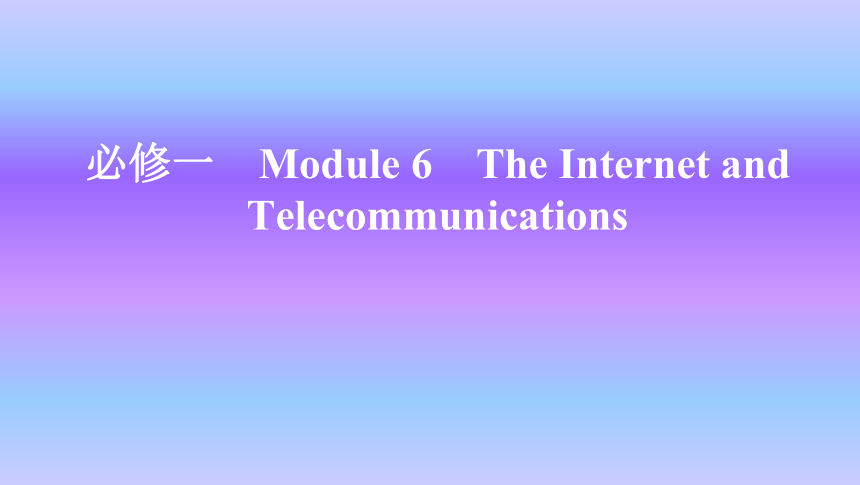
|
|
| 格式 | zip | ||
| 文件大小 | 453.3KB | ||
| 资源类型 | 教案 | ||
| 版本资源 | 外研版 | ||
| 科目 | 英语 | ||
| 更新时间 | 2019-11-14 00:00:00 | ||
图片预览


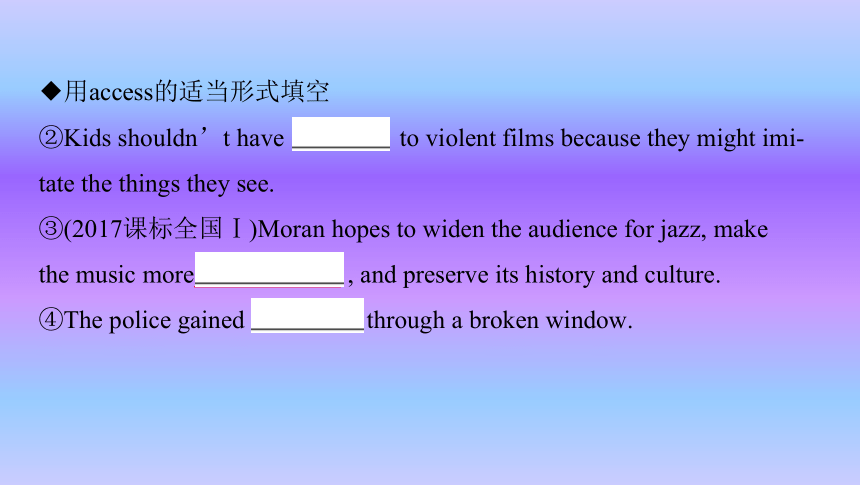
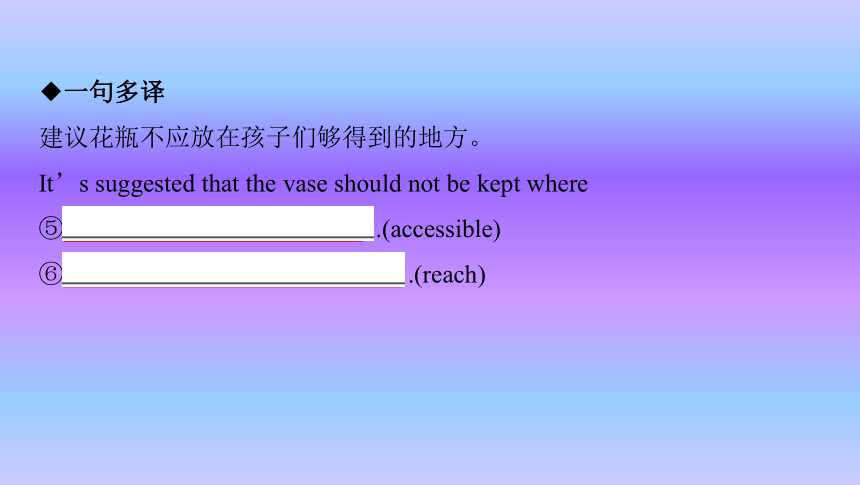
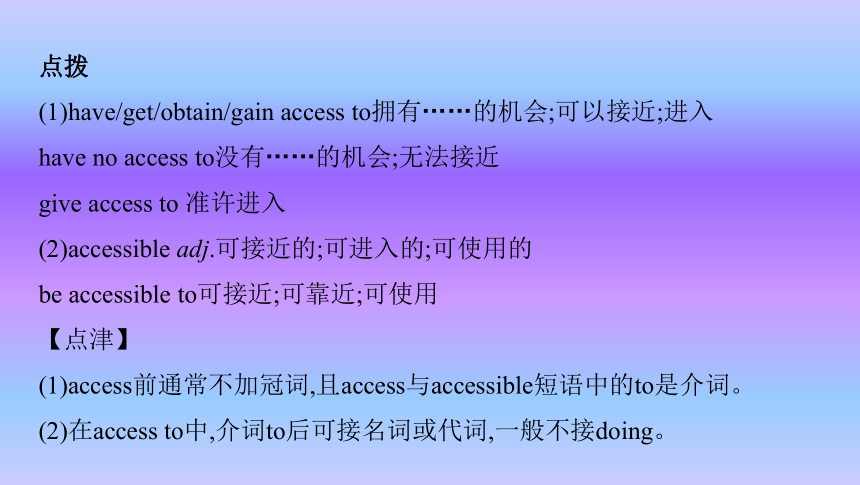

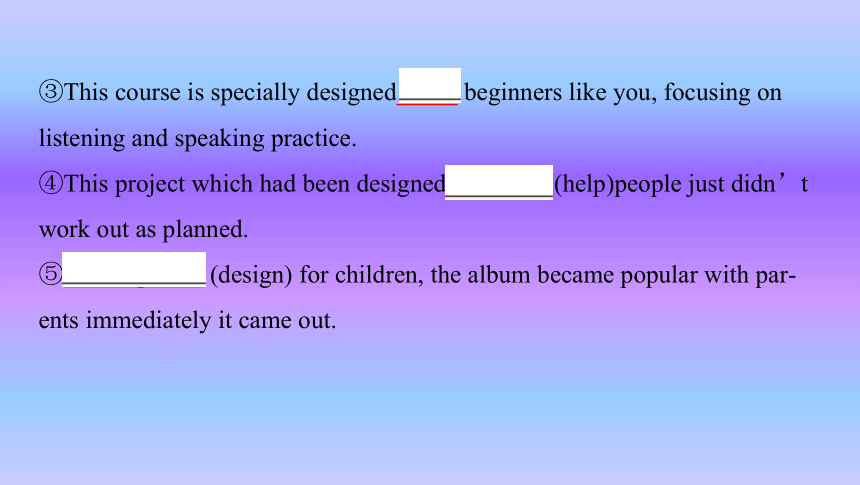


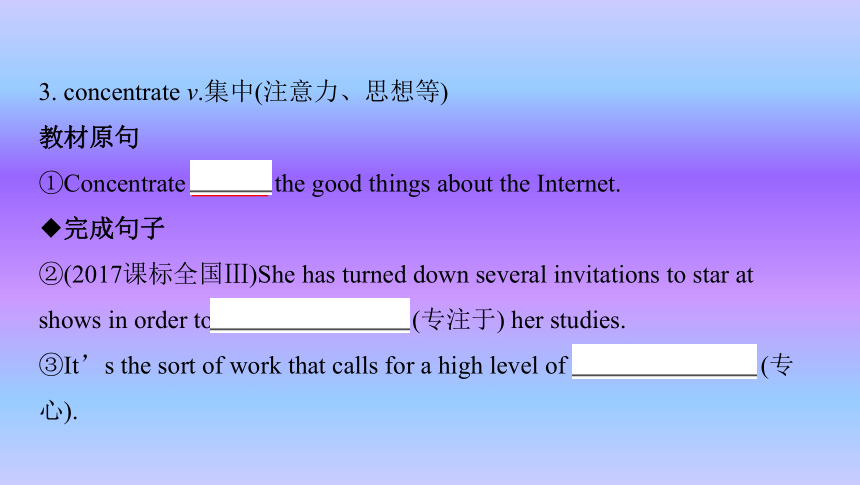
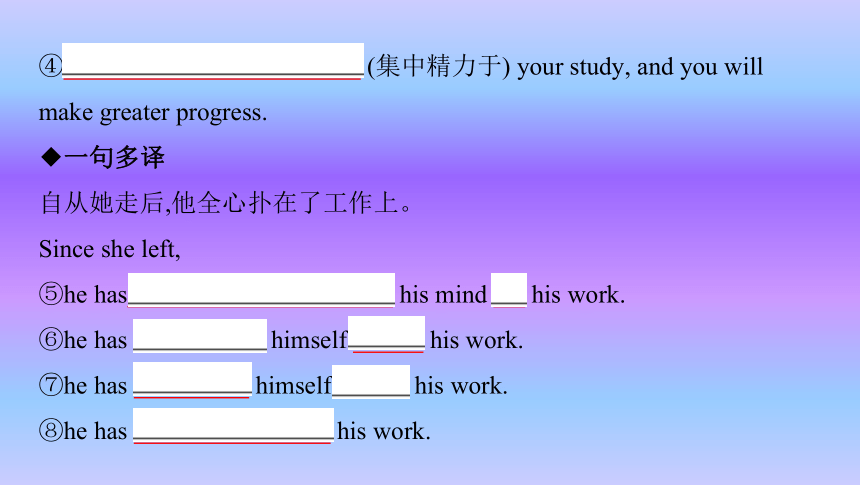

文档简介
课件31张PPT。必修一 Module 6 The Internet and
Telecommunications1. access n.接近;通路;享用(的机会或权利)v.接近;进入
教材原句
①...that allows computer users????to access????(access) information from mil- lions of websites via the Internet.重点单词◆用access的适当形式填空
②Kids shouldn’t have access????to violent films because they might imi- tate the things they see.
③(2017课标全国Ⅰ)Moran hopes to widen the audience for jazz, make the music more accessible????, and preserve its history and culture.
④The police gained access????through a broken window.◆一句多译
建议花瓶不应放在孩子们够得到的地方。
It’s suggested that the vase should not be kept where
⑤ it is accessible to children????.(accessible)
⑥ it is within children’s reach????.(reach)点拨
(1)have/get/obtain/gain access to拥有……的机会;可以接近;进入
have no access to没有……的机会;无法接近
give access to 准许进入
(2)accessible adj.可接近的;可进入的;可使用的
be accessible to可接近;可靠近;可使用
【点津】
(1)access前通常不加冠词,且access与accessible短语中的to是介词。
(2)在access to中,介词to后可接名词或代词,一般不接doing。2. design v.设计;构思 n.设计;图案
教材原句
①He ????designed????(设计) the first “web browser”, which allowed com- puter users to access documents from other computers.
◆单句填空
②She arrived just as we were leaving, but whether this was by???? acci- dent or by???? design I was not sure.③This course is specially designed for??beginners like you, focusing on
listening and speaking practice.
④This project which had been designed to help??(help)people just didn’t work out as planned.
⑤ Designed????(design) for children, the album became popular with par- ents immediately it came out.点拨
(1)design n.设计;图案
the design of the new building 新大楼的设计
by design 故意地;蓄意地
(2)design vt.设计;构思
design the system 设计系统
design your life 设计你的生活be designed for 为……而设计
design sth. to do sth.为做某事而设计某物
【点津】
“故意与偶然”的词语及短语小结:
(1)故意地:by design;on purpose;deliberately
(2)偶然地:by chance;by accident;accidentally3. concentrate v.集中(注意力、思想等)
教材原句
①Concentrate ????on???? the good things about the Internet.
◆完成句子
②(2017课标全国Ⅲ)She has turned down several invitations to star at shows in order to concentrate on????(专注于) her studies.
③It’s the sort of work that calls for a high level of concentration????(专 心).④ Concentrate on/Focus on????(集中精力于) your study, and you will make greater progress.
◆一句多译
自从她走后,他全心扑在了工作上。
Since she left,
⑤he has concentrated/?focused ???his mind on??his work.
⑥he has devoted???? himself to???? his work.
⑦he has buried???? himself in???? his work.
⑧he has been absorbed in????his work.
点拨
(1)concentrate...on/upon(doing)把……专注于……
concentrate on/upon...专注于……
(2)concentration n.专心;集中
【点津】
concentrate on的同义短语有:
focus on 集中精力于……devote onself to致力于
bury oneself in专心致志于
?全神贯注于……
put one’s heart into全神贯注于……4. average adj.平均的;普通的;平常的????n.平均;平均数;平均标准????v.平 均为
教材原句
①????The average time????(平均时间) the Chinese people spend online is 17 hours per week.
◆单句填空
②400 people a year die of this disease on????average.③ An????average of just 18.75cm of rain fell last year, making it the driest
year since California became a state in 1850.
④He was a good student and scored above???? average in most subjects.
◆完成句子
⑤(2017课标全国Ⅱ)Freddy was an average student????(一名普通的学 生), but not an average person????(一个普通的人).
⑥40 hours is a fairly average????working week for most people.
对大多数人来说,一周工作40小时是相当正常的。点拨
(1)on average 平均;一般来说
above/below average 高于/低于平均数
an average of 平均有
(2)an average price平均价格1. consist of由……组成
教材原句
①It consists????of????millions of pages of data.
◆单句填空
②Most are also equipped with automatic fire alarm systems consisting???? (consist) of heat detectors, smoke detectors and sprinklers.
③True happiness does not consist in???? the possession of money, but the joy of achievement.重点短语④Diaoyu Islands consist of a group of islands, belonging????(belong) to China since ancient times.
◆一句多译
生活中不仅仅有阳光,还有艰难的日子。
Life?点拨
(1)consist of 由……组成
consist in=lie in 在于;存在于
(2)? 由……组成
【点津】
consist of不能用于被动语态和进行时态,常考其现在分词短语在句中作 定语。类似的短语还有date from/back to、belong to等。2. come up with提出;想出
教材原句
①He came up ????with???? the idea of the World Wide Web in 1989 while he was working in Switzerland.
◆单句填空
②It was when I got back to my apartment that I first came across????my new neighbors.③Can you tell me how the accident came about?????
④Many questions came up????at the meeting, but he answered none.
⑤When Jane came to????, she didn’t know how long she had been lying in bed, unconscious.◆完成句子
⑥(2017课标全国Ⅲ)The government spent nearly 30 years coming up with????a plan to reintroduce the wolves. 政府用了将近30年的时间想出了 一个重新引入狼的计划。
⑦ When it comes to???? a job interview, you really don’t know how you
performed until you get the good-news call.当说起工作面试的时候,在你 得到好消息之前你不会知道你的表现怎么样。点拨
come about 产生;发生 come across 偶遇;偶然发现
come on 来吧;赶快;加油 ome to 加起来总共;恢复常态
come up 走近;上升;被提出 come up with 想出;提出
When it comes to...涉及;谈到1. make it+adj.+for sb. to do sth.
教材原句
①Berners-Lee made it possible for everyone????to use????(use) the Internet, not just universities and the army.重点句型◆完成句子
②My parents have always made it clear that????I shouldn’t judge a book by its cover.
我父母总是清楚明白地告诉我不要以貌取人。
③He always considers/thinks it necessary to have???? an energetic and experienced assistant.
他一直认为有一个精力充沛且经验丰富的助手是必要的。◆句型转换
④It is possible for every student in our school to use a computer in class.
→Our school makes it possible????for every student to use a computer in class.
⑤I think reading in bed is no good.
→I think it no good reading????in bed.点拨
该句型为 “make it +adj.+for sb. to do sth.”结构,其中it作形式宾语,而 真正的宾语是to do sth.。
(1)当不定式短语或从句等作宾语时,多用it作形式宾语,构成的句型主要 有:
make+ it+ adj./n.+不定式 make+ it+ adj./n.+从句
另外还有:make it+ no good/no use/no value...+doing sth.
(2)常用于这种句型的动词还有:think、consider、find、feel等。2. 部分否定
教材原句
①Our English teacher is excellent,but she????can’t help everyone????(不能帮 助所有人) in the class in 50 minutes.
◆句型转换 把下列部分否定的句子改为全部否定句。
②I do not remember all the details.
→ I remember none of the details.????③Both of them are not my brothers.
→ Neither of them is my brother.????
④Not everything she did pleased him.
→ Nothing she did pleased him.????
⑤She is not always excited.
→ She is never excited.????◆一句多译
不是所有的人都愿意帮助他人。
⑥ All people are not willing to help others.????(all...not)
⑦ Not all people are willing to help others.????(not...all)点拨
(1)具有总括意义的代词(all、both、everybody、everything等 )、形容 词(complete、whole等)和副词(completely、always、wholly、altogether 等)与否定词not连用,构成部分否定,表示“不都;并非都”。
(2)no、none、never、nobody、neither、nothing、no longer等与谓语动 词一起使用构成全部否定。
Telecommunications1. access n.接近;通路;享用(的机会或权利)v.接近;进入
教材原句
①...that allows computer users????to access????(access) information from mil- lions of websites via the Internet.重点单词◆用access的适当形式填空
②Kids shouldn’t have access????to violent films because they might imi- tate the things they see.
③(2017课标全国Ⅰ)Moran hopes to widen the audience for jazz, make the music more accessible????, and preserve its history and culture.
④The police gained access????through a broken window.◆一句多译
建议花瓶不应放在孩子们够得到的地方。
It’s suggested that the vase should not be kept where
⑤ it is accessible to children????.(accessible)
⑥ it is within children’s reach????.(reach)点拨
(1)have/get/obtain/gain access to拥有……的机会;可以接近;进入
have no access to没有……的机会;无法接近
give access to 准许进入
(2)accessible adj.可接近的;可进入的;可使用的
be accessible to可接近;可靠近;可使用
【点津】
(1)access前通常不加冠词,且access与accessible短语中的to是介词。
(2)在access to中,介词to后可接名词或代词,一般不接doing。2. design v.设计;构思 n.设计;图案
教材原句
①He ????designed????(设计) the first “web browser”, which allowed com- puter users to access documents from other computers.
◆单句填空
②She arrived just as we were leaving, but whether this was by???? acci- dent or by???? design I was not sure.③This course is specially designed for??beginners like you, focusing on
listening and speaking practice.
④This project which had been designed to help??(help)people just didn’t work out as planned.
⑤ Designed????(design) for children, the album became popular with par- ents immediately it came out.点拨
(1)design n.设计;图案
the design of the new building 新大楼的设计
by design 故意地;蓄意地
(2)design vt.设计;构思
design the system 设计系统
design your life 设计你的生活be designed for 为……而设计
design sth. to do sth.为做某事而设计某物
【点津】
“故意与偶然”的词语及短语小结:
(1)故意地:by design;on purpose;deliberately
(2)偶然地:by chance;by accident;accidentally3. concentrate v.集中(注意力、思想等)
教材原句
①Concentrate ????on???? the good things about the Internet.
◆完成句子
②(2017课标全国Ⅲ)She has turned down several invitations to star at shows in order to concentrate on????(专注于) her studies.
③It’s the sort of work that calls for a high level of concentration????(专 心).④ Concentrate on/Focus on????(集中精力于) your study, and you will make greater progress.
◆一句多译
自从她走后,他全心扑在了工作上。
Since she left,
⑤he has concentrated/?focused ???his mind on??his work.
⑥he has devoted???? himself to???? his work.
⑦he has buried???? himself in???? his work.
⑧he has been absorbed in????his work.
点拨
(1)concentrate...on/upon(doing)把……专注于……
concentrate on/upon...专注于……
(2)concentration n.专心;集中
【点津】
concentrate on的同义短语有:
focus on 集中精力于……devote onself to致力于
bury oneself in专心致志于
?全神贯注于……
put one’s heart into全神贯注于……4. average adj.平均的;普通的;平常的????n.平均;平均数;平均标准????v.平 均为
教材原句
①????The average time????(平均时间) the Chinese people spend online is 17 hours per week.
◆单句填空
②400 people a year die of this disease on????average.③ An????average of just 18.75cm of rain fell last year, making it the driest
year since California became a state in 1850.
④He was a good student and scored above???? average in most subjects.
◆完成句子
⑤(2017课标全国Ⅱ)Freddy was an average student????(一名普通的学 生), but not an average person????(一个普通的人).
⑥40 hours is a fairly average????working week for most people.
对大多数人来说,一周工作40小时是相当正常的。点拨
(1)on average 平均;一般来说
above/below average 高于/低于平均数
an average of 平均有
(2)an average price平均价格1. consist of由……组成
教材原句
①It consists????of????millions of pages of data.
◆单句填空
②Most are also equipped with automatic fire alarm systems consisting???? (consist) of heat detectors, smoke detectors and sprinklers.
③True happiness does not consist in???? the possession of money, but the joy of achievement.重点短语④Diaoyu Islands consist of a group of islands, belonging????(belong) to China since ancient times.
◆一句多译
生活中不仅仅有阳光,还有艰难的日子。
Life?点拨
(1)consist of 由……组成
consist in=lie in 在于;存在于
(2)? 由……组成
【点津】
consist of不能用于被动语态和进行时态,常考其现在分词短语在句中作 定语。类似的短语还有date from/back to、belong to等。2. come up with提出;想出
教材原句
①He came up ????with???? the idea of the World Wide Web in 1989 while he was working in Switzerland.
◆单句填空
②It was when I got back to my apartment that I first came across????my new neighbors.③Can you tell me how the accident came about?????
④Many questions came up????at the meeting, but he answered none.
⑤When Jane came to????, she didn’t know how long she had been lying in bed, unconscious.◆完成句子
⑥(2017课标全国Ⅲ)The government spent nearly 30 years coming up with????a plan to reintroduce the wolves. 政府用了将近30年的时间想出了 一个重新引入狼的计划。
⑦ When it comes to???? a job interview, you really don’t know how you
performed until you get the good-news call.当说起工作面试的时候,在你 得到好消息之前你不会知道你的表现怎么样。点拨
come about 产生;发生 come across 偶遇;偶然发现
come on 来吧;赶快;加油 ome to 加起来总共;恢复常态
come up 走近;上升;被提出 come up with 想出;提出
When it comes to...涉及;谈到1. make it+adj.+for sb. to do sth.
教材原句
①Berners-Lee made it possible for everyone????to use????(use) the Internet, not just universities and the army.重点句型◆完成句子
②My parents have always made it clear that????I shouldn’t judge a book by its cover.
我父母总是清楚明白地告诉我不要以貌取人。
③He always considers/thinks it necessary to have???? an energetic and experienced assistant.
他一直认为有一个精力充沛且经验丰富的助手是必要的。◆句型转换
④It is possible for every student in our school to use a computer in class.
→Our school makes it possible????for every student to use a computer in class.
⑤I think reading in bed is no good.
→I think it no good reading????in bed.点拨
该句型为 “make it +adj.+for sb. to do sth.”结构,其中it作形式宾语,而 真正的宾语是to do sth.。
(1)当不定式短语或从句等作宾语时,多用it作形式宾语,构成的句型主要 有:
make+ it+ adj./n.+不定式 make+ it+ adj./n.+从句
另外还有:make it+ no good/no use/no value...+doing sth.
(2)常用于这种句型的动词还有:think、consider、find、feel等。2. 部分否定
教材原句
①Our English teacher is excellent,but she????can’t help everyone????(不能帮 助所有人) in the class in 50 minutes.
◆句型转换 把下列部分否定的句子改为全部否定句。
②I do not remember all the details.
→ I remember none of the details.????③Both of them are not my brothers.
→ Neither of them is my brother.????
④Not everything she did pleased him.
→ Nothing she did pleased him.????
⑤She is not always excited.
→ She is never excited.????◆一句多译
不是所有的人都愿意帮助他人。
⑥ All people are not willing to help others.????(all...not)
⑦ Not all people are willing to help others.????(not...all)点拨
(1)具有总括意义的代词(all、both、everybody、everything等 )、形容 词(complete、whole等)和副词(completely、always、wholly、altogether 等)与否定词not连用,构成部分否定,表示“不都;并非都”。
(2)no、none、never、nobody、neither、nothing、no longer等与谓语动 词一起使用构成全部否定。
